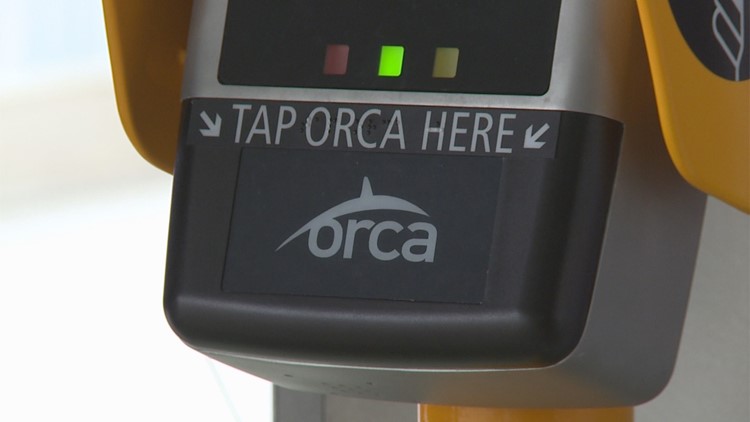SEATTLE - Jenny Savage heard of the bus changes that have the potential to affect 120,000 commuters like her around the Seattle area. They start this Saturday, so she decided to walk from her neighborhood to the new light rail station at the University of Washington and test out what her new commute downtown will be like.
“I think it’s okay. I’m a little sweaty,” she said as she laughed. “Google Maps said it was going to take me 30 minutes, but it actually took me closer to 40, which my old bus route was 20 minutes.”
Savage used to take the 71, 72 or 73. Two of them have been revised to expand service to the new station at the UW. 72 has been canceled altogether.
King County Metro Deputy General Manager Victor Obeso said the changes aim to integrate bus and rail service to better move people around the region. Starting Saturday, Metro is changing more than three dozen routes in the Capitol Hill and northeast Seattle areas.
“Over 80,000 people will see buses coming more frequently to the stops that they currently use,” he said. “We’ve tripled the number of households in northeast Seattle with access to frequent service. On Capitol Hill, we’ve doubled the number of households with access to a bus every 12 minutes or better.”
Metro released maps showing what transfers will look like near the University of Washington’s Husky Stadium.
Routes that have been in place for decades and still only serve dozens of people a day have been deleted.
“In … nearly every instance, we’ve attempted to maintain connections for people,” Obeso said. “They might have a less convenient connection through a transfer rather than their prior direct ride, but we’ve tried to maintain their ability to travel by transit.”
On Wednesday, King County Metro and Sound Transit urged people to get an ORCA card if they don’t have one already so they can transfer from bus to train without paying a fee. Obeso said there will be teams out this weekend looking for people with a transfer or light rail ticket and offering them a free ORCA card with a week’s worth of rides loaded on to it. For more specifics, scroll to the bottom of this story.
Some direct buses will continue to offer one-seat rides downtown.
“We’ve maintained the Metro commuter services weekday morning and afternoon that can take advantage of the I-5 express lanes,” Obeso said.
Another major change is the extension of the Rapid Ride C line to South Lake Union from West Seattle and the Rapid Ride D line from Ballard/Uptown to Pioneer Square/Stadium District.
Obeso called the C line the "epitome of success," citing more than 80 percent growth in ridership on that line since it launched in 2012.
Josh Kavanagh, director of transportation at the University of Washington, said the 60,000 people who come to campus each day are some of those who have "anxiously" awaited the arrival of light rail for more than a decade now.
“When I describe our community as anxious, I mean that in both senses: enthusiastic and concerned,” he said. “Link is a tremendous asset for both the University and the community, yet pick-up and drop-off activity threaten to turn University District traffic from just congested to into absolutely gridlocked.”
He called the transit revisions a “bold” and “essential” move and said more than 40 percent of commuters to UW already ride transit.
“If we all do our part, commuting in northeast Seattle is about to get a whole lot better,” he said. “This change to the Metro system is going to make it possible for more people to connect to light rail and also more people to connect to the University via bus transit and that’s going to make a difference.”
The new UW and Capitol Hill stations opened Saturday, with about 30,000 boardings by 5 p.m., according to Sound Transit. Over the last days, some commuters have complained that trains are crowded and the agency should be running three cars instead of two, especially with UW going back into session Monday in addition to the bus changes.
On Tuesday, Sound Transit answered riders on social media by saying they were monitoring the numbers and would make necessary changes if needed.
"We’re seeing great numbers already and will be rolling out a mix of two and three-car trains during rush hours starting on Monday when UW is back from spring break and the major Metro bus route restructure kicks in NE Seattle," said Bruce Gray, Sound Transit spokesperson. "Last week we averaged about 35,000 (riders) on weekdays. Monday we had an estimated 47,000 and yesterday’s numbers are looking like 57,000."
Jenny Savage, who's from New York, said she plans to role with the punches.
“It’s unfortunate because I really loved my bus route. It was an express. So it just kind of went boop, boop, boop down the line and bam I was at work which was really nice,” she said. “I’m from Brooklyn so any sort of transfer weirdness and I’m like ‘okay, I can roll with this. I’m kind of looking forward to having a flexible commute. If maybe I don’t have a meeting in the morning, I can take my time and walk. Or maybe if it’s really fast I’ll take an Uber.”
Other changes riders will notice:
- The One Bus Away app will feed signage at the University of Washington station so riders can get the latest updates on schedules.
- Metro has installed Wi-Fi in the Downtown Seattle Transit Tunnel so commuters can access the Internet, bus apps and trip planners.
- Starting in the middle part of this year, cell service will be available in transit tunnels and underground station.
To see the list of changes and find an interactive map, click here.
Metro Transit said its customer information lines will be staffed and open on Saturday and Sunday, March 26 and 27 from 8 a.m. to 5 p.m. each day. The number is 206-553-3000, TTY Relay: 771.
Other information from Metro regarding ORCA cards:
Metro will be at the main entrance at both the UW and Capitol Hill link stations with their mobile ORCA To Go sales and ORCA LIFT enrollment stations. Metro will be staffing these locations on Saturday and Sunday, March 26 and 27, from 9 a.m. to 4 p.m. each day. Customers will be able to buy all types of ORCA cards, including youth, adult, senior, and RRFP (regional reduced fare permit) cards directly on site, and load E-purse or transit passes on them.
People may also enroll in the ORCA LIFT program which allows for substantially reduced fares on Metro, ST, King County Water Taxi, Seattle Streetcar and more. They will be issued their free ORCA LIFT card on site, and then can load E-purse value or a pass on it at the ORCA To Go station. Any customer with an existing ORCA card can load E-purse value and passes at the ORCA vending machines also located at both stations. The days of operation for the on-site mobile ORCA To Go and ORCA LIFT stations will be dependent on customer demand, but Metro anticipates them to be active through April 2.



